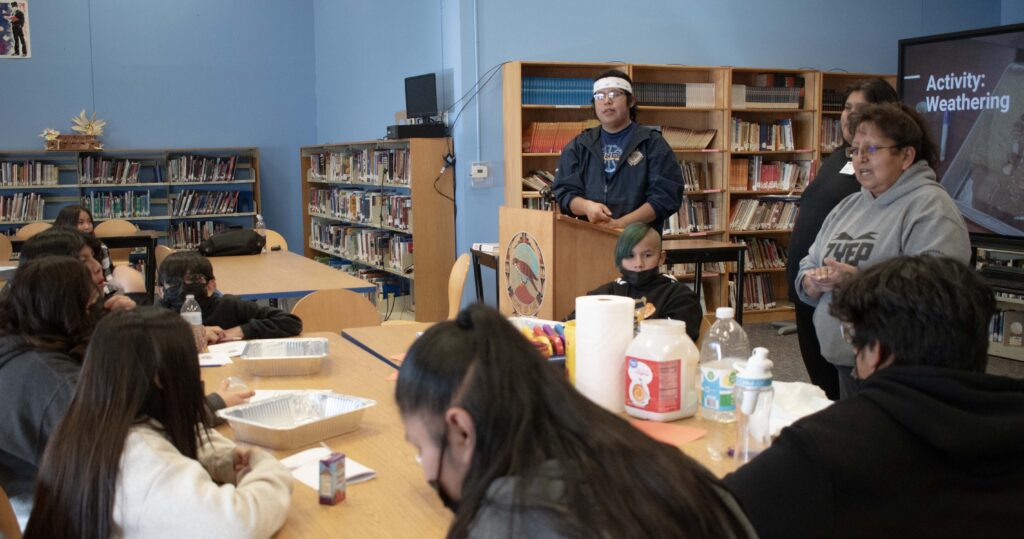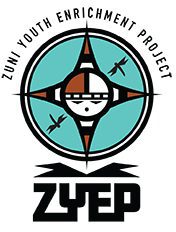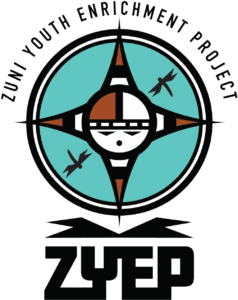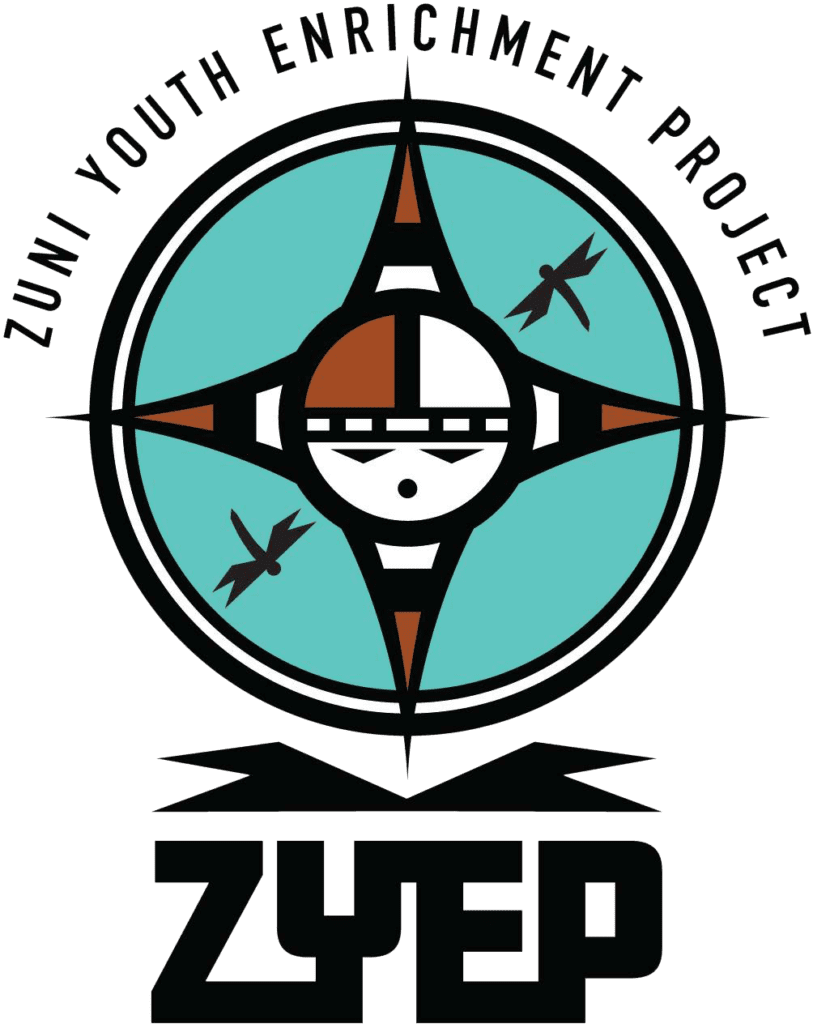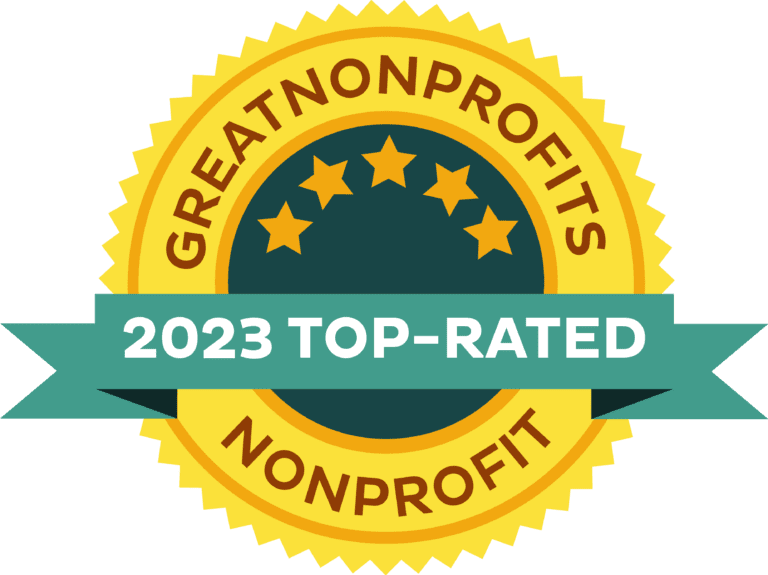ZUNI, NM (Mar. 13, 2024) — The new year is off to a busy start for the Zuni Youth Enrichment Project’s in- and after-school programs, held in conjunction with the Zuni Public School District. ZYEP’s art elective class at Zuni Middle School is drawing to a close this month, while the youth project’s wellness class at Shiwi Ts’ana Elementary School and “Rooted in Healthy Traditions” after-school program are deep into this semester’s programming.
ZMS Art Elective
At Zuni Middle School, ZYEP partners with 8th grade teacher Bryston Bowannie to offer an elective class that focuses on building resilience through art. Made possible with support from the Substance Abuse and Mental Health Services Administration (SAHMSA), the New Mexico Behavioral Health Services Division, and Dr. Dominique Dosedo, Zuni Middle School principal, and her ZMS team, the elective is offered twice per year and rotates through traditional dance, food sovereignty, and art subject areas.
Nineteen sixth-, seventh- and eighth-graders are currently participating in the ZMS art elective, which takes place at 8:15 to 9:05 a.m. daily. Classes kicked off on Jan. 4 and will conclude for the quarter on Wednesday, Mar. 20.
“During the class, students first learned to complete both narrow and wide bracelets with large beads, using patterns made by our art department,” said Kandis Quam, ZYEP’s arts assistant coordinator. “From there, they had opportunities to take on intermediate and more advanced projects.”
For example, they could work on narrow bracelets with tiny beads, using their own patterns or provided ones. They also could create an extra wide pattern for leather pouches using large beads, sewing the finished beadwork onto leather.
After that, the students could use medium beads on a bigger loom to create beadwork for men’s armbands, using their own patterns. Or, they could use the same beads and loom to create cornmeal pouch straps. In both cases, they would sew the finished beadwork onto leather.
“The majority of the students took the opportunity to create their own patterns and personalize their artwork,” Quam said. “We saw everything from Hello Kitty characters to traditional geometric rain clouds.”
Elementary Wellness Class
Meanwhile, Shiwi Ts’ana Elementary School students have been busy with their own holistic wellness class, with a curriculum that focuses on Delapna:we (Zuni stories) and traditional dance. According to Rani Yamutewa, ZYEP youth development leader, the team chose a Delapnanne (singular of Delapna:we) called “Turkey Girl” because it shares a core value with the school: kindness.
“In addition to teaching children about why it is important to listen to traditional stories and share them during the winter storytelling season, we also are able to show them how they can use the values in this story to combat bullying,” she said.
Students completed worksheets about kindness before they watched the ‘Turkey Girl’ film, which ZYEP and its partners at Ho’n A:wan Productions created during the 2021-22 Delapna:we Project.
The worksheets incorporated exercises such as “Five Things I Like About Myself,” and “Five Ways I Could Be Kind to Others.” After the film, the students engaged in a variety of crafting activities, such as creating turkey puppets and “Turkey Girl” storyboards.
“We also introduced the students to classic ZYEP winter games such as “Anshe, Kyashhida, O’dodasha” (bear, fish, mosquito) and “The Rez Game,’” Yamutewa said. “Then there is the dance component; students are always excited for this part of our wellness class.”
Homeroom teachers chose the dances for their students to perform, and students are working hard to learn the dances, songs and hand movements. Yamutewa noted that this can be intimidating for some students, but over time, they build their confidence along with their new skills.
When asked what he was most looking forward to, one student said, “Practicing for Indigenous Day, because I want to learn how to dance the rainbow dance. I want to dance hard, and be first in line.”
A fourth-grader said, “I’m excited to start practicing because we will get our extra exercise!”
“School is the only place we get to dance every week until we perform (on Indigenous Day),” said a fifth-grader. “I have my rattle ready and everything. I am a really good hunter when I dance.”
ZYEP’s wellness class at the elementary school originally started as a performing arts class. Made possible with assistance from the New Mexico Department of Health, the class now also incorporates physical activity, food sovereignty education, and the “Eat Smart To Play Hard” state curriculum, as well as traditional storytelling, traditional dance and music.
Rooted in Healthy Traditions
This semester, ZYEP also is offering the middle school edition of its “Rooted in Healthy Traditions” after-school program for the second year in a row. Made possible with support from the CDC’s Tribal Practices for Wellness in Indian Country and the New Mexico Department of Health, the program incorporates physical activity and special focus areas that include traditional art, knowledge sharing, and food sovereignty.
Running from Feb. 6 to Apr. 25, the program takes place at 3-5 p.m. every Tuesday through Thursday, with the exception of spring break on Mar. 11-22. On RHT program days, ZPSD provides snacks and bus transportation for all students.
“We currently have 14 students in sixth, seventh and eighth grades enrolled in the program,” said Kiara “Kiki” Zunie, ZYEP’s youth development coordinator. “During their time with ZYEP, they enjoy activities in four major focus areas: Shiwi STEM, Art With Meaning, Food Sovereignty, and Physical Activity.”
ZYEP Youth Development Leader Norene Lonasee leads Shiwi STEM, a focus area that provides a unique look at how Zuni cultural practices correlate to pursuits in science, technology, engineering and math. Art Assistant Coordinator Kandis Quam leads Art With Meaning, which exposes students to forms of traditional art that offer cultural teachings and increase cultural connectedness.
Food Sovereignty Leader Kenzi Bowekaty leads Food Sovereignty, in which students create healthy snacks and engage in hands-on garden activities that encompass ZYEP’s Food Sovereignty motto: “We Eat, We Share, We Grow, We Save.” And finally, Physical Activity leader Esther Siutza leads Physical Activity, which allows students to engage in 45 minutes of modern and traditional games.
When ZYEP launched RHT at Shiwi Ts’ana Elementary School and Zuni Middle School in 2022, the staff understood that the after-school program needed to provide support at multiple levels. Not only would RHT incorporate ZYEP staff to supervise and facilitate traditional art, food sovereignty, knowledge-sharing and physical activities, it also would provide positive role models in the form of youth mentors.
This year’s RHT program incorporates four experienced RHT Youth Mentors: Jazlyn Lalio, Ethan Martinez, Kallen Quetawki, and Eugene Sanchez Jr. All four are CPR- and First Aid-certified, and they took part in a weeklong training to prepare for their return to the program this year.
To learn more about the Zuni Youth Enrichment Project and its programs, and for information about making donations, partnering with ZYEP, and volunteering, call (505) 782-8000 or visit zyep.org. And, to stay up to date on the latest news and events, follow the nonprofit youth organization on Facebook (/zuniyouthenrichmentproject), Instagram (@zuniyouthenrichmentproject), YouTube (/ZuniYouth), and TikTok (/zyep09)
Founded in 2009, the nonprofit Zuni Youth Enrichment Project is dedicated to promoting resilience among Zuni youth so they will grow into strong, healthy adults who are connected with Zuni traditions. ZYEP fulfills its mission by providing positive role models, enriching programs, and nurturing spaces that contribute to the healthy development of Zuni youth. ZYEP strives to provide every child with the encouragement and opportunities they need to reach their full potential.
